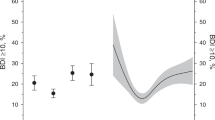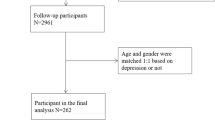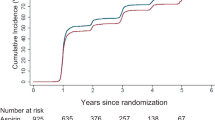Abstract
Cardiovascular drugs impact many pathways involved in depression pathophysiology and treatment. However, their distinct impact on mood is underrecognized and the literature is conflicting. Therefore, using a very large and well-characterised sample of older adults with hypertension, we aimed to investigate the prevalence of depressive symptoms in users of different antihypertensive classes. We analysed baseline data from 14,195 older individuals with hypertension enroled in a large clinical trial. Median age was 75 years. The association of antihypertensive use by class and depression prevalence, as measured by a validated depression scale, was determined using logistic regression models. Multivariable logistic models were implemented to account for important confounding factors. Our analyses showed a positive association between depressive symptoms and the use of beta blockers (BB) (OR: 1.37; 95% CI: 1.17–1.60, p < 0.01), compared with users of other antihypertensive classes. All other classes of antihypertensives (including angiotensin-converting enzyme inhibitors, angiotensin-receptor blockers, and calcium channel blockers) were not significantly associated with depressive symptoms. In secondary analysis, this relationship was stronger for lipophilic (39%) and nonselective BB (52%) compared with hydrophilic (26%) and selective medications (31%), respectively. This study adds further evidence for a probable association between BB and depression in a large sample of older adults with hypertension and no history of cardiovascular disease or heart failure. These findings should regenerate interest and increase awareness of clinicians about the possible adverse effects of these medications in an otherwise healthy older population.
This is a preview of subscription content, access via your institution
Access options
Subscribe to this journal
Receive 12 digital issues and online access to articles
$119.00 per year
only $9.92 per issue
Buy this article
- Purchase on Springer Link
- Instant access to full article PDF
Prices may be subject to local taxes which are calculated during checkout
Similar content being viewed by others
References
World Health Organization. Depression and other common mental disorders: global health estimates. Geneva World Heal Organ. 2017;1–24. http://apps.who.int/iris/bitstream/10665/254610/1/WHO-MSD-MER-2017.2-eng.pdf.
Pimenta E, Oparil S. Management of hypertension in the elderly. Nat Rev Cardiol. 2012;9:286–96. https://doi.org/10.1038/nrcardio.2012.27.
Chen L, Li Y, Chen P, Hu Y, Li Z. Prevalence of depression in patients with hypertension. Medicine. 2015;94:e1317.
Qato DM, Ozenberger K, Olfson M. Prevalence of prescription medications with depression as a potential adverse effect among adults in the United States. JAMA. 2018;319:2289. https://doi.org/10.1001/jama.2018.6741.
Amare AT, Schubert KO, Klingler-Hoffmann M, Cohen-Woods S, Baune BT. The genetic overlap between mood disorders and cardiometabolic diseases: a systematic review of genome wide and candidate gene studies. Transl Psychiatry. 2017;7:e1007–12. https://doi.org/10.1038/tp.2016.261.
Vian J, Pereira C, Chavarria V, Köhler C, Stubbs B, Quevedo J, et al. The renin-angiotensin system: a possible new target for depression. BMC Med. 2017;15:1–13.
Brownstein DJ, Salagre E, Köhler C, Stubbs B, Vian J, Pereira C, et al. Blockade of the angiotensin system improves mental health domain of quality of life: A meta-analysis of randomized clinical trials. Aust NZ J Psychiatry. 2018;52:24–38.
Wilson DL, Ried LD. Identifying iatrogenic depression using confirmatory factor analysis of the Center for Epidemiologic Studies Depression Scale in patients prescribed a verapamil-sustained-release-led or atenolol-led hypertension treatment strategy. Res Soc Adm Pharm. 2012;8:309–20. https://doi.org/10.1016/j.sapharm.2011.08.002.
Grimm R, McNeil JJ, Applegate W, Beilin L, Espinoza S, Johnston CI, et al. Study design of ASPirin in Reducing Events in the Elderly (ASPREE): a randomized, controlled trial. Contemp Clin Trials. 2013;36:555–64. https://doi.org/10.1016/j.cct.2013.09.014.
Andresen EM, Malmgren JA, Carter WB, Patrick DL. Screening for depression in well older adults: evaluation of a short form of the CES-D (Center for Epidemiologic Studies Depression Scale). Am J Prev Med. 1993;10:77–84. http://www.ncbi.nlm.nih.gov/pubmed/8037935.
Mohebbi M, Nguyen V, McNeil JJ, Woods RL, Nelson MR, Shah RC, et al. Psychometric properties of a short form of the Center for Epidemiologic Studies Depression (CES-D-10) scale for screening depressive symptoms in healthy community dwelling older adults. Gen Hosp Psychiatry. 2017;1–9. https://doi.org/10.1016/j.genhosppsych.2017.08.002.
Irwin M, Artin KH, Oxman M. Screening for depression in the older adult. Arch Intern Med. 1999;159:1701–4.
Da Silva SA, Scazufca M, Menezes PR. Population impact of depression on functional disability in elderly: results from “são Paulo Ageing & Health Study” (SPAH). Eur Arch Psychiatry Clin Neurosci. 2013;263:153–8.
Cuijpers P, Vogelzangs N, Twisk J, Kleiboer A, Li J, Penninx BW. Differential mortality rates in major and subthreshold depression: meta-analysis of studies that measured both. Br J Psychiatry. 2013;202:22–7.
Mohebbi, M, Agustini, B, Woods, RL, McNeil, JJ, Nelson, MR, Shah, RC, et al. Prevalence of depressive symptoms and its associated factors among healthy community‐dwelling older adults living in Australia and the United States. International journal of geriatric psychiatry, 2019;34:1208-16.
Miszkurka M, Zunzunegui MV, Ylli A, Deshpande N, Guralnik J, Phillips SP. Clinically relevant depression in old age: an international study with populations from Canada, Latin America and Eastern Europe. Psychiatry Res. 2016;241:236–41. https://doi.org/10.1016/j.psychres.2016.04.096.
Persoskie Alexander, Ferrer RA. A most odd ratio: interpreting and describing odds ratios. Am J Prev Med. 2017;52:224–8.
Poirier L, Tobe SW. Contemporary use of β-blockers: clinical relevance of subclassification. Can J Cardiol. 2014;30:9–15.
Battes LC, Regar E, Al Amri I, de Jaegere PPT, Pedersen SS, Oemrawsingh RM, et al. Beta blocker therapy is associated with reduced depressive symptoms 12 months post percutaneous coronary intervention. J Affect Disord. 2011;136:751–7. https://doi.org/10.1016/j.jad.2011.09.047.
Hoogwegt MT, Kupper N, Theuns DAMJ, Jordaens L, Pedersen SS. Beta-blocker therapy is not associated with symptoms of depression and anxiety in patients receiving an implantable cardioverterdefibrillator. Europace. 2012;14:74–80.
Gerstman BB, Heidi MJ, Mark B, Pyone C, James ML, Richard P. The incidence of depression in new users of beta-blockers and selected antihypertensives. J Clin Epidemiol. 1996;49:809–15.http://linkinghub.elsevier.com/retrieve/pii/0895435696000170?showall=true.
Ko, DT, Hebert, PR, Coffey, CS, Sedrakyan, A, Curtis, JP and Krumholz, HM. β-blocker therapy and symptoms of depression, fatigue, and sexual dysfunction. Jama, 2002;288:351–7.
Johansen A, Holmen J, Stewart R, Bjerkeset O. Anxiety and depression symptoms in arterial hypertension: the influence of antihypertensive treatment. The HUNT study, Norway. Eur J Epidemiol. 2012;27:63–72.
Ranchord AM, Spertus JA, Buchanan DM, Gosch KL, Chan PS. Initiation of β-blocker therapy and depression after acute myocardial infarction. Am Heart J. 2016;174:37–42. https://doi.org/10.1016/j.ahj.2015.11.018.
Verbeek DEP, Van Riezen J, De Boer RA, Van Melle JP, De Jonge P. A review on the putative association between beta-blockers and depression. Heart Fail Clin. 2011;7:89–99. https://doi.org/10.1016/j.hfc.2010.08.006.
Ringoir, L, Pedersen, SS, Widdershoven, JW, Pouwer, F, Keyzer, JM, Romeijnders, AC et al. Beta-blockers and depression in elderly hypertension patients in primary care. Family Medicine, 2014;46:447–53.
Luijendijk HJ, Van Den Berg JF, Hofman A, Tiemeier H, Stricker BHC. β-Blockers and the risk of incident depression in the elderly. J Clin Psychopharmacol. 2011;31:45–50.
Stoschitzky K, Sakotnik A, Lercher P, Zweiker R, Maier R, Liebmann P, et al. Influence of beta-blockers on melatonin release. Eur J Clin Pharmacol. 1999;55:111–5.
Tahara, Y, Takatsu, Y, Shiraishi, T, Kikuchi, Y, Yamazaki, M, Motohashi, H, et al. Age-related circadian disorganization caused by sympathetic dysfunction in peripheral clock regulation. npj Aging and Mechanisms of Disease, 3;2017:1–11.
Leentjens AFG. Neurobiological correlates of emotional processing in Parkinson’s disease: a systematic review of experimental studies. J Psychosom Res. 2017;100:65–76. https://doi.org/10.1016/j.jpsychores.2017.07.009.
Harrell CS, Gillespie CF, Neigh GN. Energetic stress: the reciprocal relationship between energy availability and the stress response. Physiol Behav. 2016;166:43–55. https://doi.org/10.1016/j.physbeh.2015.10.009.
McCallum L, Boal AH, Muir S, Touyz RM, Smith DJ, Dominiczak AF, et al. Monotherapy with major antihypertensive drug classes and risk of hospital admissions for mood disorders. Hypertension.2016;68:1132–8.
Nasr SJ, Crayton JW, Agarwal B, Wendt B, Kora R. Lower frequency of antidepressant use in patients on renin-angiotensin-aldosterone system modifying medications. Cell Mol Neurobiol. 2011;31:615–8.
Lionakis N, Mendrinos D, Sanidas E, Favatas G, Georgopoulou M. Hypertension in the elderly. World J Cardiol. 2012;26:135–47.
Ntourakis D, Agouridis AP, Johnson EO, Tsioutis C, Yiallouris A, Agapidaki E, et al. Adrenal aging and its implications on stress responsiveness in humans. Front Endocrinol. 2019;10:1–12.
Tully, PJ, Peters, R, Pérès, K, Anstey, KJ and Tzourio, C. Effect of SSRI and calcium channel blockers on depression symptoms and cognitive function in elderly persons treated for hypertension: three city cohort study. International psychogeriatrics, 2018;30:1345–54.
Atkinson, LZ, Colbourne, L, Smith, A, Harmer, CH, Nobre, AC, Rendell, J, et al. The Oxford study of Calcium channel Antagonism, Cognition, Mood instability and Sleep (OxCaMS): study protocol for a randomised controlled, experimental medicine study. Trials, 2019;20; p.120.
Agustini, B. and Berk, M. Medications with depression as an adverse effect. Jama, 2018;320:1815.
Bangalore S, Sawhney S, Messerli FH. Relation of beta-blocker-induced heart rate lowering and cardioprotection in hypertension. J Am Coll Cardiol. 2008;52:1482–9.
Parekh N, Page A, Ali K, Davies K, Rajkumar C. A practical approach to the pharmacological management of hypertension in older people. Ther Adv Drug Saf. 2017;8:117–32.
Lindholm LH, Carlberg B, Samuelsson O. Should β blockers remain first choice in the treatment of primary hypertension? A meta-analysis. Lancet. 2005;366:1545–53.
Acknowledgements
The authors acknowledge the efforts of research personnel and long-term involvement of participants of the ASPREE Study.
Funding
The study is supported by the National Institute on Aging and the National Cancer Institute at the National Institutes of Health (grant number U01AG029824); the National Health and Medical Research Council of Australia (grant numbers 334047 and 1127060); Monash University (Australia); the Victorian Cancer Agency (Australia). MB is supported by a NHMRC Senior Principal Research Fellowship (APP1059660 and APP1156072) and CMR is supported by a NHMRC Senior Research Fellowship (APP1045862).
Author information
Authors and Affiliations
Consortia
Corresponding author
Ethics declarations
Conflict of interest
The authors declare that they have no conflict of interest.
Additional information
Publisher’s note Springer Nature remains neutral with regard to jurisdictional claims in published maps and institutional affiliations.
Supplementary information
41371_2020_303_MOESM1_ESM.docx
Supplement Table 1: Examining association between the use of antihypertensive drugs and depressive symptoms (CES-D ≥8) using non-medicated (or diuretic monotherapy) as controls:
41371_2020_303_MOESM2_ESM.docx
Supplement Table 2: Combination therapies and their association with depressive symptoms in multivariate model with users of other classes and non-medicated as controls (n = 14,195) *
Rights and permissions
About this article
Cite this article
Agustini, B., Mohebbi, M., Woods, R.L. et al. The association of antihypertensive use and depressive symptoms in a large older population with hypertension living in Australia and the United States: a cross-sectional study. J Hum Hypertens 34, 787–794 (2020). https://doi.org/10.1038/s41371-020-0303-y
Received:
Revised:
Accepted:
Published:
Issue Date:
DOI: https://doi.org/10.1038/s41371-020-0303-y
This article is cited by
-
Brain-penetrant calcium channel blockers are associated with a reduced incidence of neuropsychiatric disorders
Molecular Psychiatry (2022)
-
Associations of Cardiovascular Agents and Metformin with Depression Symptoms: A Cross-Sectional Analysis from the HUNT Study, Norway
Drugs - Real World Outcomes (2022)
-
Drug Safety in Episodic Migraine Management in Adults. Part 2: Preventive Treatments
Current Pain and Headache Reports (2022)
-
Onset and recurrence of psychiatric disorders associated with anti-hypertensive drug classes
Translational Psychiatry (2021)



